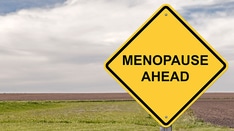PARIS — How can we manage menopause symptoms induced by treatment for cancer or those occurring naturally after a woman has had cancer? Should hormone replacement therapy be offered? What alternatives are available? Martha Hickey, MD, PhD, chair of obstetrics and gynecology at the University of Melbourne, Melbourne, Australia, reviewed the evidence in a session at the FIGO 2023 Gynecology and Obstetric Congress.
In women being treated for cancer, "menopause-related symptoms are one of the most common consequences of anticancer therapy," said Hickey. These symptoms worsen fatigue and sleep issues and can also impact treatment efficacy, causing patients to neglect their treatment or even stop it completely.
Early menopause may be caused by surgery to remove the ovaries, chemotherapy resulting in poor ovarian function, hormone suppression therapy, or radiation therapy. The effect may be temporary or permanent, depending on age, type of medicine, the dose administered, and the treatment duration.
HRT Not Recommended
To improve their quality of life, "affected women seek help for vasomotor symptoms as a priority, as well as for fatigue, vaginal dryness, and sexual problems." It is estimated that half of survivors of breast cancer and cancers affecting the pelvic region develop long-term sexual issues.
Hormone replacement therapy (HRT) may be considered to lessen these symptoms, but only in certain conditions, said Hickey. "HRT is the most effective treatment for vasomotor symptoms. It also reduces vaginal dryness and can improve sleep."
Hickey, a renowned menopause specialist, has reviewed the literature and compiled the situations requiring or not requiring HRT, depending on cancer type. The findings of this review, parts of which were presented during her session, will be published in The Lancet.
According to the gynecologist, HRT is not advised after breast cancer, due to an increased risk of cancer, especially for estrogen-receptor positive (ER+) cancer types. Nevertheless, it may be considered for cases of triple-negative cancer if there are no other options available, "in young women," and after discussion as part of a multidisciplinary team meeting.
For other gynecologic cancers, HRT may be considered, depending on the tumor type. For cases of ovarian cancer, for example, hormone treatment is an option for mucinous carcinoma or high-grade serous tumors but should be avoided in cases of low-grade serous tumors, which often express hormone receptors.
Regarding uterine cancer, Hickey also advises against treating the symptoms of an early menopause by using HRT when a uterine sarcoma is present; these cancers are usually sensitive to estrogen. They can, however, be used for patients with squamous cell carcinoma or adenocarcinoma.
Gynecologic cancers aside, HRT can be considered for most cases, except esophageal and stomach cancer, as these can be sensitive to estrogen. The same goes for lung and bladder cancer, although data surrounding the risks associated with hormone treatment in such cases is insufficient.
Antidepressants, Antiepileptics, Anticholinergics
When HRT is contraindicated or women do not wish to take hormones, several treatment options can be offered, indicated Hickey, who has also developed a specific algorithm with her colleagues.
Of the medication options, Hickey proposes opting for low-dose antidepressants (paroxetine, venlafaxine, escitalopram, citalopram), the antiepileptic drug gabapentin (100-900 mg/day), the antihypertensive clonidine (0.1 mg), or the anticholinergic oxybutynin (2.5 to 5 mg), assessing their efficacy on vasomotor symptoms after 2 months.
None of these treatments was shown to be superior to the others in easing menopause symptoms. The algorithm reveals one contraindication: the antidepressant paroxetine must not be used in patients taking tamoxifen as part of their adjuvant therapy for breast cancer.
The nondrug options include cognitive behavioral therapy (CBT), to teach women how to manage their symptoms, and hypnosis.
Vaginal Dryness
Intravaginal dehydroepiandrosterone (DHEA) is the option of choice for women complaining of vaginal dryness and dyspareunia (pain during sexual intercourse) following cancer. Topical application of estrogen eases dyspareunia but is potentially risky after breast cancer. Intravaginal testosterone also reduces pain.
The options are limited for women who wish to avoid hormones. Although silicone-based gels are more effective than water-based ones, "80% of women with vaginal dryness continue to experience pain during or after sexual intercourse," specified Hickey. Only application of lidocaine gel (4%) shows significant efficacy.
Despite the increasing use of laser treatment to treat symptoms of the urogenital tract, the technique’s efficacy in managing vulval and vaginal pain has not been shown in randomized studies. The benefits reported could be linked to a placebo effect.
Finally, Hickey emphasized the importance of treating sleep disorders that affect "more than 60% of women after cancer." Here also, CBT has been shown to be of benefit. This type of therapy also has the advantage that sessions can be held online.
Melatonin may also be prescribed, as can the hypnotic drug zolpidem, which is linked to improvements in sleep and quality of life after breast cancer.
This article was translated from the Medscape French edition.
Credits:
Lead image: iStock/Getty Images
Medscape Medical News © 2023
Cite this: Choosing the Right Approach to Cancer and Menopause Symptoms - Medscape - Nov 21, 2023.











Comments